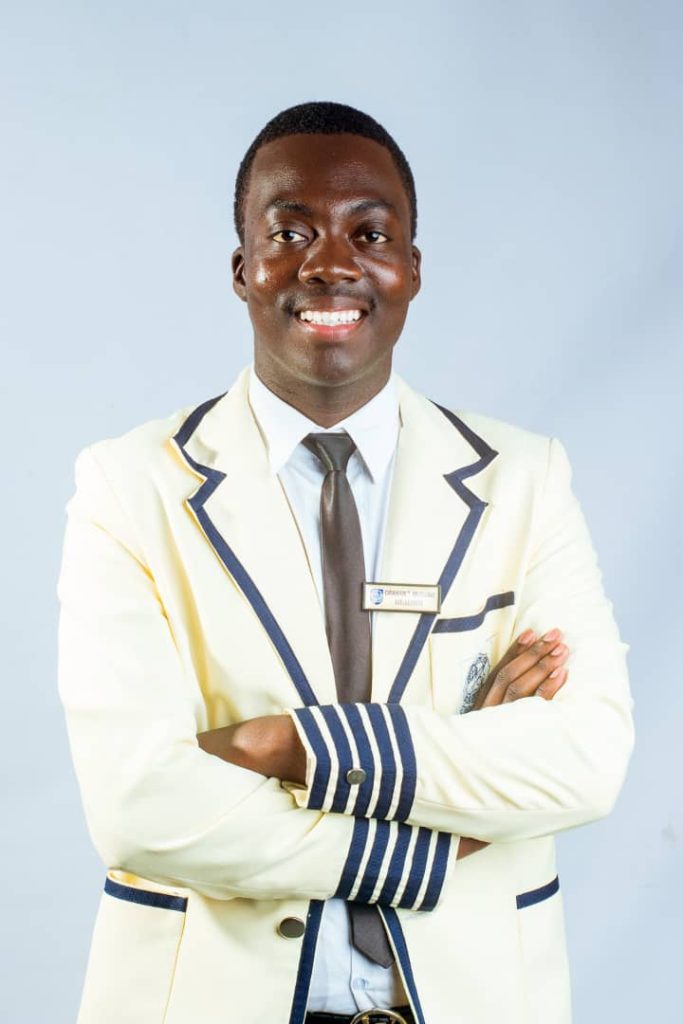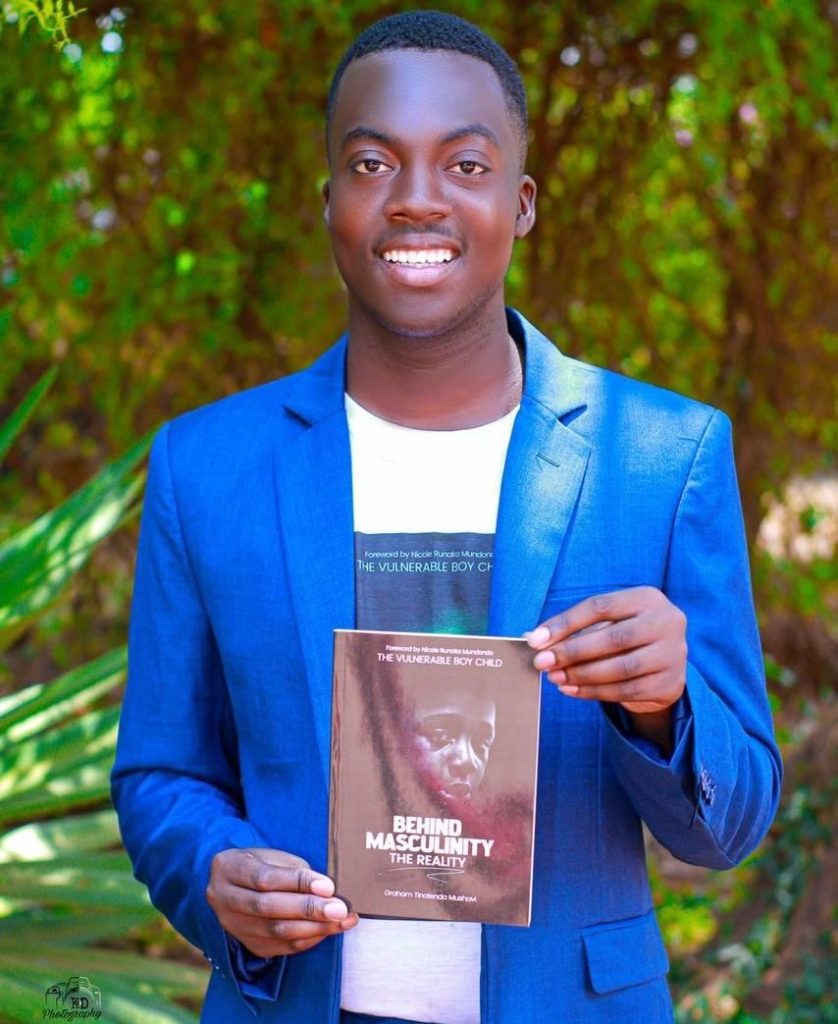
Gweru-based 18-year-old Graham Mushavi realized that there are some realities behind this so-called Masculinity, and he decided to reveal these issues the boy child is facing behind what society expects of men through the novel titled “Behind Masculinity -The Reality.”
“Over the past years, we’ve been trying to promote gender equality through the girl child empowerment, and it was a very good initiative, and it has been quite progressive too. However, in the quest for gender equality the boy child is now being neglected and in the process is subjected to all forms of abuse. Now that the boy child is abused, he endures the pain from inside and then resorts to drug and substance abuse and at most times suicide as a way of escape. This is because boys are guided by society’s expectations “Men don’t cry,” said Graham.
The writing process for Graham had not been an easy one considering the research involved using different research approaches. Having gathered information from the internet and multiple teenagers, he decided to write the first draft. It reached his publisher Miss Audrey Chirenje of Chances Inc for the final editing. Much patience was required because of the back and forth with the publishing team editing the book. He affirmed that it was by the grace of the Lord that he and the publishing team were able to consummate the work that had commenced.
When I asked him why he came up with the book and what he was hoping to achieve, Graham said:
“The reason why I came up with the book was and is to promote and maintain the gender equality that we’ve been calling out for and I’m hoping that my book reaches various target audiences.”
Conversations that I recently engaged in around gender equality have shown how to a certain extent the boy child is left wanting and disadvantaged in issues of empowerment. It is imperative to formulate policies that clearly outline ways to strike a balance for both the girl and boy child, leaving no child behind.
“I think that both men and women are equal. They should be treated the same way in terms of job opportunities and a chance to be heard. That’s why we now have women actively participating in places where only men were initially found, that is, media, politics, etc. However, the only problem now comes when people start to pay particular attention to one specific gender leaving the other one vulnerable. But overall, I think we can strike a balance if all genders are involved in addressing issues affecting them because it is believed that “It’s only the blind man who understands the problems that affect him,” he said.
In the olden days, it was a norm that when boys were of age, there were platforms like Padare where young boys met older and mature mentors who taught them issues about growing up and how to transition from a boy to a man. Graham Mushavi also noticed how due to the rise in technology these platforms are now rarely available.
“Google has now become the young generation’s uncles and grandpas, while parents and children are now spending much of their time on their gadgets working online or following what’s trending in the entertainment world. Another thing is that family disintegration is prevalent in most families. Many people have cut connections with their extended family thus leading to the exhaustion of platforms like Padare. So, I think that parents need to monitor what their children are doing online and spend more time with their families while at the same time maintaining relationships with extended family members.”
Society has prescribed standards for boys and men, oftentimes they are impractical and exaggerated. Countless stereotypes demand you to act in a certain way because you are a man. Graham has no personal experience to refer to, however during his time as Headboy at Nashville High School, 90% of his speeches addressed girl child issues. This provoked a lot of young boys who felt their concerns were not met. They told him of the many problems they were facing as boys leading them to act in very unruly ways to be regarded as ‘real men’.
The process of laying out a story can be hectic if your idea meets much scrutiny and negative feedback within your circles. It is important to have cheerleaders who believe in the vision of the book and make sure you stay focused on your goal. For Graham, he was very fortunate enough to have supportive people around him.
“My parents are my main support system. I also have friends and family, my school Headmaster Mr Manenji, my friend and little sister Runako Mundondo, my brothers in the literary industry Takudzwa Masapa, and Samuel Chawana.Then my amazing publisher Aunty Audrey Chirenje among others. All these believed in my vision and kept me motivated.”
Every person may be gifted and acquire information in their quest for greatness. However, the one who gets in-depth knowledge from a qualified and practicing leader will be most effective. Mentorship and nurturing set apart the leader and successful leader.
“To me, mentorship means the ability to lead, inspire, and motivate someone to achieve his goal. Yes, I’ve got many mentees who are willing to learn and have learned a lot from me. Three of the panelists at my book launch are now aspiring authors and are currently working on their books. So, mentorship is important, it allows me to assist them.”
In our quest for perfection or gaining total enlightenment, our lives revolve around certain principles, standards, and desires meant to guide us along life’s journey. Sometimes our very existence focuses on making amends and correcting mistakes in others’ lives – forewarning them and rescuing them from pitfalls they face. That one thing that is close to your heart, which you are fighting to achieve for yourself as well as the younger generation, always surfaces in day-to-day encounters.
The teen author said, “I’m fighting to be the best of the best out of this so-called dotcom generation. In becoming a cut above the rest, I will serve as an inspiration to my fellow ama2k that we can do the most and trend for all the good reasons in this generation. We can lay a foundation for the generation to come so they begin their lives on a clean base.”
Behind Masculinity – The Reality is Graham Mushavi’s debut fictitious novel.
“The book is based on some real-life events that have been told by existing people and have been re-imagined and are now being told from my perspective. Characters, names, and incidents portrayed in the book are the work of my re-imagination and they have been fictionalized to portray the points based on the research carried out.”
His motivation and inspiration to write are drawn from his undying love for Literature. “I’ve been doing Shona and English Literature in High School and I’m now writing my works.”
The target audience for the book is “Everyone. Anyone concerned about the welfare and well-being of children.”
Besides being an author, Graham Mushavi was born Graham Tinotenda Mushavi, an 18-year-old teenager. I recently graduated from High School at Nashville High School where I was doing my A level and was also the Headboy. I am also a founder of Young Generation Ambassadors (YGA) a club advocating for youth-related issues with drug and substance abuse being the major one. With that said I’m also an award-winning youth leader with another award to my name which is an appreciation from MIET Africa, a youth mentorship organization for the work I’ve done as their future student representative.”
The young leader’s parting words to boys and men all over the world is, “Know that you are greatly appreciated. You don’t have to misbehave or be violent to be regarded as a real man. If you have a problem, find someone to confide in. It’s not being weak to share your problems with trusted people. Drug and substance abuse and suicide are not the way out of tough situations. Don’t bottle things up, speak out and get help.
Drawing from what he has learned and what has worked for him in his creative journey, Graham advised all the writers out there to keep writing no matter what. Concentrate on your goal. With the right focus and direction, you will get to the last page of the book step by step.
Find more information and updates from Graham on the social media platforms: Facebook @Graham Mushavi, Instagram @tyno_grae, TikTok @Tyno05




